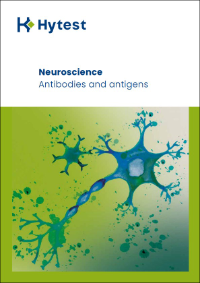As human life expectancy increases, the prevalence of neurodegenerative diseases is also rising annually. Additionally, traumatic brain injury (TBI) has been identified as a significant risk factor for the development of neurodegenerative conditions. Given the growing burden of these disorders, early diagnosis, disease progression monitoring, and therapy evaluation have become increasingly critical.
Evaluate
Neuroscience MAbs
already today!
Request samples

Advancements in biomarker research have enabled the detection of key pathological proteins, including amyloid-beta (Aβ), neurofilament light chain (NfL), and glial fibrillary acidic protein (GFAP), in blood and cerebrospinal fluid (CSF).
Take Alzheimer’s disease (AD) as an example: one of the most significant breakthroughs in AD diagnostics in recent years has been the development of blood-based biomarkers, with some assays demonstrating high diagnostic accuracy. This advancement has made the biological diagnosis of AD—which previously required positron emission tomography (PET) or cerebrospinal fluid (CSF) analysis—more widely accessible.
Similarly, efforts to slow the progression of Parkinson’s disease (PD) are advancing through the integration of sensitive biomarkers, enabling earlier detection and more effective disease management. Additionally, in the context of TBI, the use of imaging and fluid biomarkers to predict outcomes and identify high-risk patients in the acute phase is steadily increasing.
The development of fluid biomarker assays would facilitate large-scale screening in a cost-effective manner, enhancing both early intervention and long-term monitoring. Hytest high-quality antibodies and antigens are specifically designed to support the detection of key biomarkers such as Aβ, NfL, and GFAP, among others, contributing to the advancement of fluid-based diagnostic assays for neurodegenerative diseases and TBI.
Neurofilament light (NfL)
NfL is a neuronal cytoplasmic protein found in axons. It has been validated as a specific body fluid biomarker of neuro-axonal injury. The concentration of NfL in cerebrospinal fluid (CSF) and blood correlates with the degree of axonal damage.
Read more >>
Glial fibrillary acidic protein (GFAP)
GFAP is an astrocyte structural protein. GFAP has been authorized as one of the biomarkers for mild traumatic brain injury (mTBI) and its level shows a correlation with the clinical severity after the injury..
Read more >>
S100 proteins
S100 proteins are synthesized in astroglial cells and can be used as sensitive and reliable markers for central nervous system damage.
Read more >>
Beta-amyloid, human
Beta-amyloid, which is also referred to as Aβ, is a peptide that is derived from the amyloid precursor protein. It is one of the most established biomarkers for the progression of Alzheimer’s disease (AD).
Others:
Cat# 4N6: Neuron-Specific Enolase, Human, antibody
Cat. #8C10b: Calmodulin, bovine, antigen
Cat. #8C10h: Calmodulin, human, antigen
